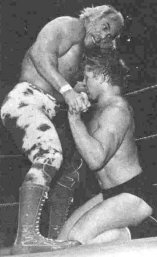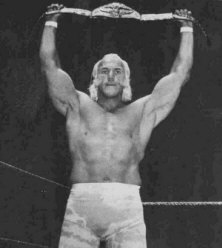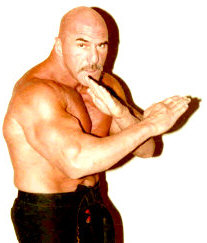|
Chappell: This brings out a
subject that’s covered in the
book, that fans in the
Mid-Atlantic area in the late
70s wouldn’t have been able to
experience. When you were the
WWWF Champion, the fans were
actually starting to cheer for
you when you were a heel. But
Vince McMahon, Sr. was committed
to bring in Bob Backlund as the
new Champion in 1978, even
though you were selling out
everywhere.
I
often ask wrestlers in these
interviews whether holding a
Title was significant to them.
The response is typically a
mixed one. But in your case, as
you mentioned earlier, having to
drop the WWWF Title sent your
career, your life for that
matter, spiraling downward.
Graham: Yeah, I mean, some
Titles…they don’t mean that much
to folks. But THIS particular
Title…meant New York City and
Madison Square Garden, you see?
This is the real big-time here!
We’re talking about New York
City, the World’s most famous
city, and Madison Square Garden,
the World’s most famous sporting
Arena…well, you know, that’s a
real big deal!

Superstar Graham battles Bob
Backlund for
the
WWWF (WWE) Heavyweight Title
Chappell: It had to be tough
to give up that spot.
Graham: (pauses) When I had
to pass the torch onto Backlund…it
was very difficult to accept.
And, of course, the fans didn’t
accept Backlund…
Chappell: As Champion?
Graham: Yes. Vince Sr. had
to push him down the fan’s
throats. They immediately
starting calling Backlund
‘boring.’
Chappell: (pauses) As early
as 1978?
Graham: Oh yeah…and they’d
get on him about his haircut,
and about his freckles and stuff
like that.
The
transition from a flamboyant
person like myself, that
persona, to a very quiet type
mid-western kid…was astounding!
It was like people were shocked
that this thing actually
happened, you know?
Chappell: BIG change, that’s
for sure.
Graham: As you know, having
read the book, I called the
title to one of my chapters,
‘But I Like My Robe.’
Chappell: Yes…
Graham: And, Dave, can I
tell the Mid-Atlantic fans real
quickly how that happened?
Chappell: Please!
Graham: On a return match
with Bob Backlund, at the
[Madison Square] Garden, after I
gave him the belt, he wore the
belt and he had this long black
boxing robe OVER the BELT!
Chappell: (laughs) Uh oh! My
website partner and title belt
aficionado, Dick Bourne, is
going to really cringe when he
hears this!
Graham: I came walking out
with my tie-dye and all the
stuff, and Vince McMahon Sr.’s
standing there before we go into
the ring, and he says, ‘Bobby,
the BELT, you have to show the
BELT! My God, it’s all about the
BELT!’
Chappell: (laughing)
Graham: Backlund’s answer to
Vince Sr., was, ‘But I like my
robe.’
Chappell: (laughs) Truly
unbelievable…Backlund must not
have had a clue.
Graham: (laughing) It’s
really a sad story, actually.
Chappell: It is!
Graham: I think it was a
problem with the kid’s mental
stability, concerning that
event. To actually hide the
belt, underneath a black robe. A
boxing robe…ankle length boxing
robe.
Chappell: Looking back on it
now, it seems incredible that
Backlund was made Champion over
you at that time. You were
selling out everywhere as
Champion. But as you go into in
the book, Vince Sr. was
committed to Backlund from the
get-go, and he didn’t waver from
that.
Of
course, the mindset of the
business was quite different in
the late 1970s. I thought it was
interesting how you went to
Vince Sr. and pleaded for a
continued run as Champion as a
babyface, but he stayed the
course and stuck with Backlund.
Graham: He was committed to
Backlund, and he didn’t want to
lose face with other promoters
that he told he was going to do
this. He committed himself to
one year to get Backlund
over…then he knew he was making
a mistake.

World Wide Wrestling Federation
Champion
Superstar Billy Graham
Also I told him, I said, ‘Sir,
don’t you understand for the
first time ever there are people
wearing Superstar t-shirts out
there. I’m a heel, and there are
Superstar Billy Graham big
posters for the first time
ever.’
Chappell: Superstar, I
suspect at that time in the
business, nobody really
understood what your popularity
meant. As Sr.’s father, Vincent
K. McMahon, has said since in so
many words, you were very much
ahead of your time!
Graham: Vince McMahon, Sr.
was afraid that I was too big to
be a babyface. I just tried to
convince him that of course I
could sell, I could sell, I
could sell. And that I could
talk, and I could entertain the
folks.
But
he was committed to the old
tradition…old school tradition.
So, Backlund was basically force
fed to the folks for almost five
years.
Chappell: Right, from 1978
through the dawning of the Hulk
Hogan era in the WWF in late
1983. And, of course, after
Vince, Sr. passed away and
Vincent K. McMahon took over the
reigns…there was that tanned,
muscular babyface that was made
Champion.
But
it wasn’t Superstar Billy
Graham…it was Hulk Hogan. Had
that switch been made to run you
as a babyface Champion in 1978,
you have to wonder if Superstar
Billy Graham could have been
pushed like a pre-Hulk Hogan
media and merchandising machine
back then.
Graham: Without question,
that would have happened. The
fans were turning me…
Chappell: Do you often think
back and say to yourself, ‘What
if?’
Graham: Oh sure, sure. I
would have been good for the
next six or seven years with
that belt, I think.
Because, like I said, the FANS
were turning me babyface…not the
office. The fans were doing it.
And when that happens, when they
turn you, you’re good to go.
That means you’ve got the real
deal. The fans want you to be a
certain way, and when they want
you to turn…you turn for them.
Chappell: Of course, that
turn was never allowed to
happen, and you had some real
tough years immediately after
that. The book gets into a lot
of detail as to what was
happening to you in the late
1970s and very early 1980s when
there were all those rumors
about your having died.
A
lot of drug issues, among other
things, but you did resurface in
the early 1980s with the karate
gimmick that you’ve mentioned
previously. Where did the
martial arts persona originate
from?
Graham: What led me into the
martial arts deal was that I
decided that I’d come back and
give it another run. But I was
not going to come back and be
the original Superstar Billy
Graham, who had New York City in
the palm of his hand.
Chappell: Why not?
Graham: I just refused to
come back and be the original
Superstar Billy Graham, because
I knew, obviously, that I wasn’t
getting the belt back.
Chappell: No, I’m sure by
the time you came back to the
then WWF in 1982, you weren’t on
the short list to get Backlund’s
belt. There probably wasn’t even
a list at all!
Graham: So, I just decided
to come back as a ‘non-person,’
a flat person, a flat monotone
karate expert…that meant
absolutely nothing. It was
nothing even close to Superstar
Billy Graham.

(Eddie Cheslock Photo)
Chappell: It really wasn’t.
I remember looking at the Apter
magazines during that time frame
and seeing photos of you in that
martial arts attire, and
wondering, ‘Where is Superstar
Billy Graham?’
Graham: He was gone by that
point….I just refused to come
back as the original Superstar
Billy Graham. And that’s what
sparked the karate gimmick.
Chappell: The karate gimmick
seemed to be so far from the
Superstar Billy Graham that was
headlining in New York, and
let’s not forget in the
Mid-Atlantic area as well, in
the 1970s.
That’s just a small example of
the many changes, and ups and
downs, that typifies the story
of your life. One reason I think
the book is so powerful, is that
it takes you from the very
earliest part of your life…and
tells your story as one of
continual upheaval and
perseverance from the very
start. Most of the information
in the book about your early
life, under your given name of
Wayne Coleman, is new to your
fans. What stands out most to
you from that part of your life?
Graham: Yes, without a
doubt, the collapse of myself…as
a person who could have self
control. And the collapse of
myself…turning to drugs.
Chappell: Certainly, any
folks wanting to get a VERY
vivid picture of steroid and
drug use and abuse by an elite
athlete, and all that entailed,
will find your book a real
eye-opener from that
perspective.
Graham: And, also, then
dragging my wife Valerie through
this.
Chappell: She’s certainly an
amazing woman. But, of course, I
don’t need to tell you that!
Graham: This book is really
OUR story!
Chappell: There’s no doubt
about that.
Graham: I took my wife from
the penthouses of New York, to
the hellish slums and dirty
motels that went with my drug
addiction and overdoses of
drugs.
All
the hell that Valerie was drug
through…
Chappell: There are some
episodes that you two went
through together…that are
incredible. And very scary.
Graham: But the larger
factor in our story, is how
courageous she was, and that she
stayed with me through all those
years…the commitment she made to
me, through hell or high water.
Chappell: Your story
definitely has its share of hell
and high water.
Graham: (pauses) Yeah, so
many things, many of them very
difficult.
NEXT:
PART FOUR
|